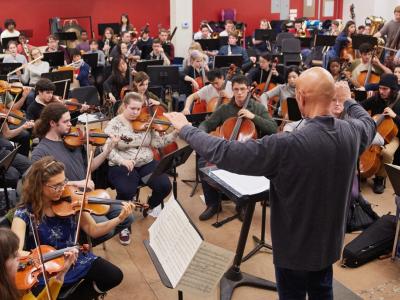Working in the music industry involves a never-ending series of projects. For musicians, managers, and industry entrepreneurs, this could include founding a new business, going on tour, a major marketing campaign, getting a Website up and running, and much, much, more. These projects come in all sizes, budgets, and levels of complexity, but for each, setting up a process for planning, executing, and monitoring your work is crucial in achieving your goals. Project Management for Musicians will provide you with an overall approach, with many specific tools, to help you successfully complete your music industry-related projects. You will develop a clearer sense of the work you want to do, and be able to break down abstract ideas into realistic components - along with realistic action plans to accomplish them.
Project Management for Musicians begins by exploring your ultimate vision of success, described in clear, methodical, tangible ways in order to bring it into the realm of possibility. From there, the course focuses on how to break down the goals of a project into smaller, more manageable units of work. Then, you'll learn ways of accomplishing the work while monitoring to ensure it's done in support of your intentions. You'll discover tools to help at all stages of the project's lifecycle, including planning, execution, and closure. The course explores how to keep the project on budget, run according to schedule, and yield the best results possible, with the least possible chance of failure. You'll also learn to create reusable tools and systems, so that completing similar projects will be easier next time.
You will learn project management techniques by applying them to relevant music-related situations, as well as to your own real work. It presents interviews with highly effective musicians and industry experts at all stages of their careers, from various segments of the music industry - a rock band leader, educators, a producer, administrators, a production manager, and others. You'll see how they do their work, hear them talk about their priorities, and then explore the project management structures that suit the type of work they are doing.
We will discuss a wide spectrum of approaches to project management that are useful for music projects, including those that have their roots in aerospace and aviation, manufacturing, and software development industries. The approaches include traditional project management, agile software development, scrums, Getting Things Done, Six Sigma, lean manufacturing, and others. It is a diverse and targeted tool set suited for the vastly complex spectrum of projects that music industry professionals are likely to undertake.
Ultimately, the reason to study project management is to improve the quality and reach of your work, so that you can be as successful as possible in the music industry and your musical endeavors. Weekly assignments in the course are tailored to your interests. With the learning gained in this course, you will gain the skills to advance your own project forward.
By the end of the course, you will be able to:
- analyze visions great and small, and develop systems to bring their work to successful conclusions
- map project management tools to your vision and scope, so that the tools you use help fulfill your goals
- mitigate risk to budget, timeline, scope, and level of quality
- manage teams effectively
- organize work flow, synchronizing all efforts to be in support of the ultimate project vision
Syllabus
Lesson 1: Project Management in a Nutshell
- Introduction to Project Management
- Lifecycle Models
- What Does a Managed Project Look Like?
- Your Path
Lesson 2: Vision and Scope
- Vision
- Project Scope Overview
- Deliverables
- Acceptance Criteria
- Exclusions
- Constraints
- Assumptions
- Dependencies
- Stakeholders
- Version Control
Lesson 3: Understanding the Work
- Working Documents
- Work Breakdown Structures
- Imagining the Work
- Other Breakdown Structures
- Task Lists
- WBS Dictionary
Lesson 4: Finances
- Interview with Dana Levit, Financial Planner
- Project Accounting Overview
- Budgets
- How to Estimate
- Reducing Expenses
- Breaking Even
Lesson 5: Time
- Estimating Duration
- Compressing Time
- Dependencies
- Critical Paths
- Compressing Time
- Events and Milestones
Lesson 6: The Project Team
- Assigning Resources
- Roles in Projects
- Building a Project Team
- Effective Meetings
- Places and Things
Lesson 7: Execution
- Initiation
- Software Tools
- Execution Models
- Using a Project Plan
- Delegating
Lesson 8: Managing Workflow
- Office Triangle
- Clutter Management
- Prioritizing Work
- Managing Multiple Projects
Lesson 9: Monitoring Progress, Risk Management, and Quality Control
- Risk Identification and Mitigation
- Management Techniques for Mitigating Risk
- Contingency Plans
- Checklists for Milestones and Q/A
Lesson 10: Creative Problem Solving
- Crisis Recovery
- Scope Redefinition
- Intensive Management
Lesson 11: Contracts, Tax Forms, Royalties, Invoices, and Other Necessities
- Contracts and Letters of Agreement
- Invoices and Tax Forms
- Copyrights and Royalties
- Insurance
Lesson 12: Project Closure
- Assessing Success
- Analysis for Reusability
- Documentation and Archiving
- Your Life's Work: Choosing the Next Project
Requirements
Prerequisites and Course-Specific Requirements
Prerequisite Courses, Knowledge, and/or Skills
This course does not have any prerequisites.
Textbook(s)
- Project Management for Musicians: Recordings, Concerts, Tours, Studios, and More by Jonathan Feist (Berklee Press, 2013)
- Recommended: Music Industry Forms: The 75 Most Important Documents for the Modern Musicians by Jonathan Feist (Berklee Press, 2014)
Software
- Smartsheet (a free, extended trial will be provided), or another project management software of your choice
- By registering for the course, you are granting permission for Berklee Online to register a free account on your behalf using your registered first name, last name, and email address.
- Word processing software, such as Microsoft Word, Google Docs (free), Apple Pages, Apache OpenOffice (free), etc.
Student Deals
After enrolling, be sure to check out our Student Deals page for various offers on software, hardware, and more. Please contact support@online.berklee.edu with any questions.
General Course Requirements
Below are the minimum requirements to access the course environment and participate in Live Classes. Please make sure to also check the Prerequisites and Course-Specific Requirements section above, and ensure your computer meets or exceeds the minimum system requirements for all software needed for your course.
Mac Users
PC Users
All Users
- Latest version of Google Chrome
- Zoom meeting software
- Webcam
- Speakers or headphones
- External or internal microphone
- Broadband Internet connection
Instructors
Author & Instructor
Jonathan Feist is editor in chief of Berklee Press, where he has been bringing music education products to a worldwide market since 1998. He is the author and instructor of Berklee Online courses "Project Management for Musicians" and "Music Notation and Score Preparation Using Finale.” He is author of the books Project Management for Musicians (Berklee Press, 2013) and Berklee Contemporary Music Notation (Berklee Press, 2017) and the co-author of Essential Songwriter (Berklee Press, 2004) and The Berklee Practice Method Teacher's Guide (Berklee Press, 2004). He has also written hundreds of articles about music, published through About.com, Keyboard Magazine, MakeMusic's Finale blog, and Berklee’s TakeNote online magazine. As an editor, he is credited on over two hundred books about music. Jonathan is a composer, songwriter, and photographer. He holds a bachelor's and master's degree in composition from New England Conservatory of Music.
Instructor
Linda Embardo is the Assocate Director for Training and Communications at Berklee College of Music. During her time at Berklee, she authored and acted as the primary instructor of the Project Management Fundamentals course available to faculty and staff at the college. Her current role is focused on change management, including training, communications, and knowledge management for all IT projects impacting the college, bringing a wealth of practical experience to her teaching. Holding a Bachelor's degree in Applied Management from Grand Canyon University and a Master's degree in Communications from Arizona State University, her educational background complements her professional expertise, making her a valuable resource for those looking to enhance their project management skills.
Instructor
Mareika McLaughlin is an online course developer at Berklee Online with more than 10 years of experience working in project management in various fields both internationally and domestically. In Cape Verde, Mareika founded the country’s first rugby union, organized and ran national championships for five consecutive years, got the entire project funded by Coca Cola, and even had the project reviewed by the International Rugby Board. In the US she started and managed a massive flipped classroom project for the Massachusetts International Academy and their partner company in Beijing, China, Cernet Education. Mareika holds a Master’s degree in Education from Boston University and a CAPM certification from the Project Management Institute. She is a seasoned and dedicated teacher and she is passionate about project management.
What's Next?
When taken for credit, Project Management for Musicians can be applied towards the completion of these related programs:
Related Certificate Programs
Related Degree Majors
Questions?
Contact our Academic Advisors by phone at 1-866-BERKLEE (U.S.), 1-617-747-2146 (INT'L), or by email at advisors@online.berklee.edu.











